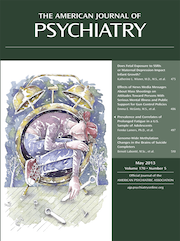Loss of Libido in a Woman With Schizophrenia
Abstract
Sexual dysfunction is common among women with schizophrenia treated with antipsychotic medication. Multiple factors influence sexual function and reproductive health in this patient population, including the effects of medications on prolactin secretion and the complexities of making contraceptive decisions in the context of a serious mental illness. The author explores the causes and management of loss of libido as illustrated by a case vignette and describes the course and outcome of a clinical intervention that was implemented to alleviate the sexual dysfunction. Possible approaches and potential pitfalls of the intervention are described. Clinicians must be open to discussions regarding sexual concerns, relationships with sexual partners, and reproductive issues with women suffering from schizophrenia. Both patients and clinicians need to be aware of unintended effects of intervention. Opportunities exist for improved education among clinicians to achieve a more proactive approach to sexual health in women receiving antipsychotic medication.



